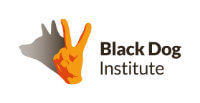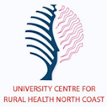National Sorry Day is an opportunity each year to remember and acknowledge the Stolen Generations and reflect on the role we all play in the healing process for Aboriginal and Torres Strait Islander individuals, families, and communities. In the spirit of Sorry Day we invited Sharnie Roberts from WellMob, a proud descendant of the Widjabul Wia-bul clan and member of the eMHPrac team to share her story and perspectives on The Stolen Generations and Reconciliation.

I decided to start with significant events that occurred throughout Australian history in the lead up to Reconciliation Week 2022. Starting with:
Bring Them Home Report
On 26th of May 1997 the Bring Them Home Report was tabled in federal parliament after the ongoing National Inquiry into the separation of Aboriginal and Torres Strait Islander children from their families. The Bringing Them Home Report acknowledged the Aboriginal and Torres Strait Islander people who were stolen and forcibly removed from their families, communities, and culture. Australian government policy forced our people into institutions and missionaries.
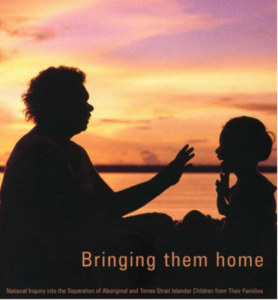
“The first step in healing trauma is often the acknowledgment of truth and the delivery of an apology”
The Healing Foundation | Supporting the Healing of Stolen Generations Survivors, Families and Communities, 2022
To commemorate the anniversary of the report, the following year on May 26th 1998, the first ever ‘National Sorry Day’ to remember the injustices, abuse, and ongoing suffering, and grief experiences by the Stolen Generations occurred (National Sorry Day | Australian Human Rights Commission, 2020)
I thought about starting this article with the stories of the Stolen Generation. As I reflected upon policies that have impacted my family and people over generations and generations, writing this article began to make me feel unwell because of the deep sorrow we as a people collectively carry.
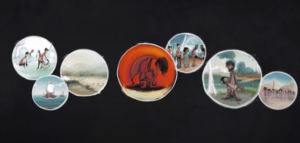
Department of Health | WA health Journey of health and wellbeing
If you would like to learn more about the Stolen Generations, please refer to the links below:
The National Apology
February 13th, 2008, former Prime Minister Kevin Rudd apologised on behalf of the Federal government to Aboriginal and Torres Strait Islander peoples, particularly the Stolen Generations and their families, for the Australian governments past policies bound by law and implemented by practices that have ongoing impacts on the social and emotional wellbeing of Aboriginal and Torres Strait Islander peoples in the past, present and future.
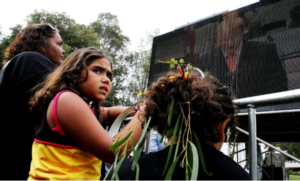
The National Apology to The Stolen Generations, 2008 – PM Kevin Rudd
The National Apology to The Stolen Generations included a proposal for a policy commission to ‘Close The Gap’ between Aboriginal and Torres Strait Islander people and non-Indigenous Australians in matters such as:
- Life expectancy
- Educational achievement
- Economic opportunity
For more information about the National Apology, please refer to the links below:
National Sorry Day 2022
National Sorry Day is an annual event observed on May 26th as an opportunity for all Australians to come together to acknowledge Australia’s historical truths, and in the spirit of ‘Working Together’ and joining forces to take the steps towards healing for the Stolen Generations, their families, and communities.
Sorry Day “An Important Part of Our Healing”
NAIDOC, 2021
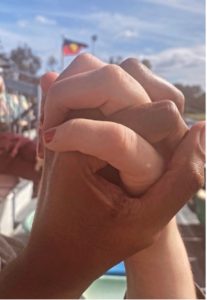
Picture by Sharnie Roberts, taken during Reconciliation Week 2021 of herself and dear friend and ally who always rallies behind her First Nations friends to learn, support and advocate
Truth Telling
“I think it is good also for people to understand how past practices continue to play out today and that families & communities are still affected by the stolen generations & ongoing removal of our children from families that may be struggling to heal.”
David Edwards, WellMob Project Director
For those who would like to learn more about the systematic assimilation practises that were implemented into Australian policy as “Aboriginal Protection” since the 19th century through to the late 1960’s, I would recommend watching the famous movie, Rabbit Proof Fence or visiting The Healing Foundation Apology Fact Sheet written by The Healing Foundation, or listen and learn from our resilient Stolen Generation survivor survivors Telling Our Stories.
The Australians Together website bring together First Nations peoples to tell their stories and to unpacking the truth about Australia’s history. The aim is to help educate our Australian counterparts to understand how historical, and political injustices impacts Aboriginal and Torres Strait Islander peoples today.
Aboriginal and Torres Strait Islander Peoples can’t simply ‘get over it’ and ‘move on’
Australia’s colonial history characterised by oppression, dispossession, violence, and has had a significant impact on the social and emotional wellbeing of Aboriginal and Torres Strait Islander peoples for generations and generations. This is known as intergenerational trauma.
Aboriginal and Torres Strait Islander Peoples can’t simply ‘get over it’ and ‘move on’
The Australians Together explains:
“Trauma is passed down from the first generation of survivors who directly experienced or witnessed traumatic events to future generations. This is referred to as intergenerational trauma, and can be passed on through parenting practices, behavioural problems, violence, harmful substance use and mental health issues.”
Intergenerational Trauma, 2021
Why and how does intergenerational trauma affect Aboriginal and Torres Strait Islander People?
“We need to raise awareness that policies of segregation, assimilation, forced removal & even in some ways “reconciliation” incurs complex trauma and related over-representation in disease, unemployment/ under-education, incarceration & self-harm/ suicide.”
David Edwards, WellMob Project Director
Healing Foundation developed an animated video that explains the trauma of colonisation and how intergenerational trauma presents as mental illness.
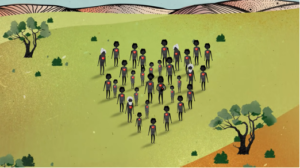
Aboriginal and Torres Strait Islander People make up 3% of the Australian population. However, still overrepresented in Australian government institutions
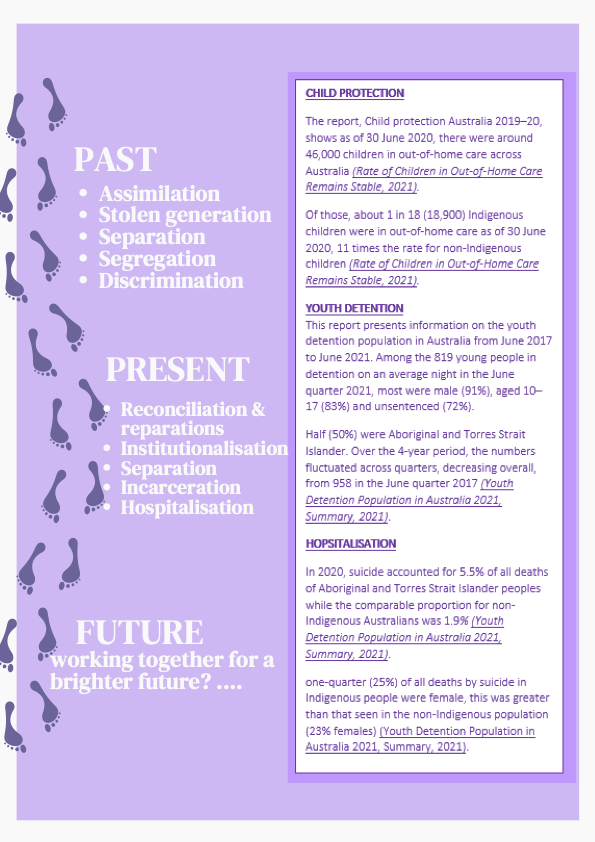
The Australians Together explains that:
“The high rates of poor physical health, mental health problems, addiction, incarceration, domestic violence, self-harm and suicide in Indigenous communities are directly linked to experiences of trauma. These issues are both results of historical trauma and causes of new instances of trauma which together can lead to a vicious cycle in Indigenous communities.”
Intergenerational Trauma, 2021
So, getting over it isn’t that simple… and moving on can’t occur without intrinsic actionable steps and working together towards reconciliation.
What Can We Do? Be Brave Make Change
“Sorry Day & National Reconciliation Week are a good opportunity to strengthen non-Indigenous health workforce knowledge on past (& continuing) practices of forced removal of children.”
David Edwards, WellMob Project Director
Cultural considerations when working together:
- Health is holistic and social and emotional wellbeing encompasses those cultural connections as a significant factor to greater health outcomes for Aboriginal and Torres Strait Islander peoples
- Remember that cultural connections are a core part of oneself & identity therefore, connection/ reconnection is important for Aboriginal and Torres strait Islander peoples healing process
- Consider how culturally appropriate methods, assessment and measuring tools are when working with Aboriginal and Torres strait Islander young people
- Consider cultural perspective to trauma informed practises when working with Aboriginal and Torres Strait Islander young people
WellMob: Resources for Young People
Workers can feel confident to share any online wellbeing resources they find with their clients. There are also training resources to support your work in the community, and resources to help to support non-Indigenous workers who want to learn more about culturally secure practices.
There are various types of resources found on WellMob that can support the work you do with Aboriginal and Torres Strait Islander young people.
Healing Our Way
[podcast]
A podcast series is developed by The Healing Foundation that creates a space for young people to explore topics about intergenerational trauma, racism, identity, culture, and healing. The podcast is hosted by Wuthathi and Torres Strait Islander woman, Jax Compton with special guests.
Healing the trauma of the Stolen Generations
A podcast series is developed by The Healing Foundation that creates a space for young people to explore topics about intergenerational trauma, racism, identity, culture, and healing. The podcast is hosted by Wuthathi and Torres Strait Islander woman, Jax Compton with special guests.
Pledge your support towards fulfilling the recommendations from the ‘Bringing Them Home report’
Celebrate Reconciliation Week
Garrima Bugelbeh
References
Intergenerational trauma. (2021). Australians Together. https://australianstogether.org.au/discover/the-wound/intergenerational-trauma/#intergentraumareference1
NAIDOC. (2021). Aboriginal Incursions. https://aboriginalincursions.com.au/special-aboriginal-ceremonial-events/national-sorry-day
National Sorry Day | Australian Human Rights Commission. (202, May 25). Australian Human Right Commission. https://humanrights.gov.au/about/get-involved/events/national-sorry-day



